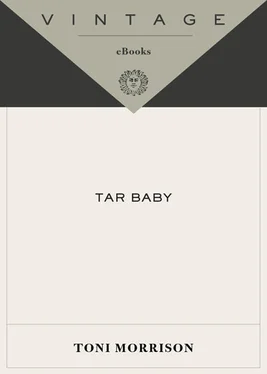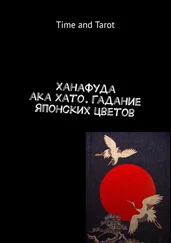Toni Morrison - Tar Baby
Здесь есть возможность читать онлайн «Toni Morrison - Tar Baby» весь текст электронной книги совершенно бесплатно (целиком полную версию без сокращений). В некоторых случаях можно слушать аудио, скачать через торрент в формате fb2 и присутствует краткое содержание. Жанр: Старинная литература, на русском языке. Описание произведения, (предисловие) а так же отзывы посетителей доступны на портале библиотеки ЛибКат.
- Название:Tar Baby
- Автор:
- Жанр:
- Год:неизвестен
- ISBN:нет данных
- Рейтинг книги:3 / 5. Голосов: 1
-
Избранное:Добавить в избранное
- Отзывы:
-
Ваша оценка:
- 60
- 1
- 2
- 3
- 4
- 5
Tar Baby: краткое содержание, описание и аннотация
Предлагаем к чтению аннотацию, описание, краткое содержание или предисловие (зависит от того, что написал сам автор книги «Tar Baby»). Если вы не нашли необходимую информацию о книге — напишите в комментариях, мы постараемся отыскать её.
Tar Baby — читать онлайн бесплатно полную книгу (весь текст) целиком
Ниже представлен текст книги, разбитый по страницам. Система сохранения места последней прочитанной страницы, позволяет с удобством читать онлайн бесплатно книгу «Tar Baby», без необходимости каждый раз заново искать на чём Вы остановились. Поставьте закладку, и сможете в любой момент перейти на страницу, на которой закончили чтение.
Интервал:
Закладка:
Margaret opened her eyes and looked into his. “Hit me,” she said softly. “Hit me, Valerian.”
His shuddering fingers went wild at the thought of touching her, making physical contact with that skin. His whole body recoiled. “No,” he said. “No.”
“Please. Please.”
“No”
“You have to. Please, you have to.”
Now he could see the lines, the ones the make-up had shielded brilliantly. A thread here and there and the roots of her hair were markedly different from the rest. She looked real. Not like a piece of Valerian candy, but like a person on a bus, already formed, fleshed, thick with a life which is not yours and not accessible to you.
“Tomorrow,” he said. “Perhaps tomorrow.”
Every day she asked him, every day he answered, “Tomorrow, perhaps tomorrow.” But he never did and she was hard-pressed to think of a way to ease their mutual sorrow.
ON THE FIRST DAY of the year, Margaret pushed open the kitchen door. Ondine was there as she always was; the braids Margaret had snatched were folded quietly now across her head. Margaret, having had the dream she ought to, felt clean, weightless as she walked through the doors and stood at the oak table. Ondine was napping, her head resting on the back of a chair, her feet resting on another. When she heard the grunt of the door hinges, she woke at once and stood up, alert.
“No, no. Sit back down, Ondine.”
Ondine shoved her feet into her moccasins and continued to stand. “Can I get you something?” she asked out of habit and out of a need to do what was wanted of her and get the woman out of the kitchen.
“No. No, thank you.” Margaret sat down and did not seem disturbed by the painful silence Ondine was keeping after the refusal. She looked past the black woman’s silhouette to a place in the shutters where the sky showed through.
“I knew you knew,” she said. “I always knew you knew.”
Ondine sat down without answering.
“You loved my son, didn’t you?” It was more a statement than a question.
“I love anything small that needs it,” said Ondine.
“I suppose I should thank you for not saying anything, but I have to tell you that it would have been better, Ondine, if you had. It’s terrible living in the same house with your own witness. But I think I understand it. You wanted me to hate you, didn’t you? That’s why you never said anything all those years. You wanted me to hate you.”
“No, I didn’t. You…you wasn’t a whole lot on my mind.”
“Oh, yes I was, and you felt good hating me, didn’t you? I could be the mean white lady and you could be the good colored one. Did that make it easier for you?”
Ondine did not answer.
“Anyway, I came in here to tell you that I’m sorry.”
Ondine sighed. “Me too.”
“We could have been friends, Ondine. Like at first when I used to come in your kitchen and eat your food and we laughed all the time. Didn’t we, Ondine? Didn’t we use to laugh and laugh. Didn’t we? I have it right, don’t I?”
“You got it right.”
“But you wanted to hate me, so you didn’t tell.”
“There was nobody to tell. It was woman stuff. I couldn’t tell your husband and I couldn’t tell mine.”
“Why didn’t you tell me? I mean why didn’t you scream at me, stop me, something. You knew and you never said a word.”
“I guess I thought you would let us go. If I told Sydney he might tell Mr. Street and then we’d be out of a job—a good job. I don’t know now what I thought, to tell the truth. But once I started keeping it—then it was like my secret too. Sometimes I thought if you all let me go there won’t be anyone around to take the edge off it. I didn’t want to leave him there, all by himself.”
“You should have stopped me.”
“You should have stopped yourself.”
“I did. I did stop myself after a while, but you could have stopped me right away, Ondine.”
Ondine put the heels of her hands on her eyelids. When she removed them, her eyes were red. She blew out a breath and she was old. “Is that my job too? To stop you?”
“No. It’s not your job, Ondine. But I wish it had been your duty. I wish you had liked me enough to help me. I was only nineteen. You were—what—thirty? Thirty-five?”
Ondine tilted her head and looked at her employer sideways. She raised her eyebrows slowly and then squinted. It was as though she saw Margaret for the first time. She shook her head back and forth back and forth in wonder. “No,” she said. “I wasn’t thirty-five. I was twenty-three. A girl. Just like you.”
Margaret put her forehead into her palm. The roots of her sunset hair were brown. She held her head that way for a moment and said, “You have to forgive me for that, Ondine. You have to.”
“You forgive you. Don’t ask for more.”
“You know what, Ondine? You know what? I want to be a wonderful, wonderful old lady.” Margaret laughed a rusty little bark that came from a place seldom used. “Ondine? Let’s be wonderful old ladies. You and me.”
“Huh,” said Ondine, but she smiled a little.
“We’re both childless now, Ondine. And we’re both stuck here. We should be friends. It’s not too late.”
Ondine looked out of the window and did not answer.
“Is it too late, Ondine?”
“Almost,” she said. “Almost.”
AT SOME POINT in life the world’s beauty becomes enough. You don’t need to photograph, paint or even remember it. It is enough. No record of it needs to be kept and you don’t need someone to share it with or tell it to. When that happens—that letting go—you let go because you can. The world will always be there—while you sleep it will be there—when you wake it will be there as well. So you can sleep and there is reason to wake. A dead hydrangea is as intricate and lovely as one in bloom. Bleak sky is as seductive as sunshine, miniature orange trees without blossom or fruit are not defective; they are that. So the windows of the greenhouse can be opened and the weather let in. The latch on the door can be left unhooked, the muslin removed, for the soldier ants are beautiful too and whatever they do will be part of it.
Valerian began going back to his greenhouse. Not as early as before; now he waited until after the breakfast rain. He was still telling Margaret, “Tomorrow. Perhaps tomorrow.” But he did not change anything in there. Didn’t sow or clip or transpose. Things grew or died where and how they pleased. Isle des Chevaliers filled in the spaces that had been the island’s to begin with.
He thought about innocence there in his greenhouse and knew that he was guilty of it because he had lived with a woman who had made something kneel down in him the first time he saw her, but about whom he knew nothing; had watched his son grow and talk but also about whom he had known nothing. And there was something so foul in that, something in the crime of innocence so revolting it paralyzed him. He had not known because he had not taken the trouble to know. He was satisfied with what he did know. Knowing more was inconvenient and frightening. Like a bucket of water with no bottom. If you know how to tread, bottomlessness need not concern you. Margaret knew the bottomlessness—she had looked at it, dived in it and pulled herself out—obviously tougher than he. What an awful thing she had done. And how much more awful not to have known it. Which was all he could say in his defense: that he did not know; that the postman passed him by. Perhaps that was why he had never received the message he’d been waiting for: his innocence made him unworthy of it. The instinct of kings was always to slay the messenger, and they were right. A real messenger, a worthy one, is corrupted by the message he brings. And if he is noble he should accept that corruption. Valerian had received no message, but after waiting so long, to receive, know and deliver its contents, imperceptibly he had made it up. Made up the information he was waiting for. Preoccupied himself with the construction of the world and its inhabitants according to this imagined message. But had chosen not to know the real message that his son had mailed to him from underneath the sink. And all he could say was that he did not know. He was guilty, therefore, of innocence. Was there anything so loathsome as a willfully innocent man? Hardly. An innocent man is a sin before God. Inhuman and therefore unworthy. No man should live without absorbing the sins of his kind, the foul air of his innocence, even if it did wilt rows of angel trumpets and cause them to fall from their vines.
Читать дальшеИнтервал:
Закладка:
Похожие книги на «Tar Baby»
Представляем Вашему вниманию похожие книги на «Tar Baby» списком для выбора. Мы отобрали схожую по названию и смыслу литературу в надежде предоставить читателям больше вариантов отыскать новые, интересные, ещё непрочитанные произведения.
Обсуждение, отзывы о книге «Tar Baby» и просто собственные мнения читателей. Оставьте ваши комментарии, напишите, что Вы думаете о произведении, его смысле или главных героях. Укажите что конкретно понравилось, а что нет, и почему Вы так считаете.











